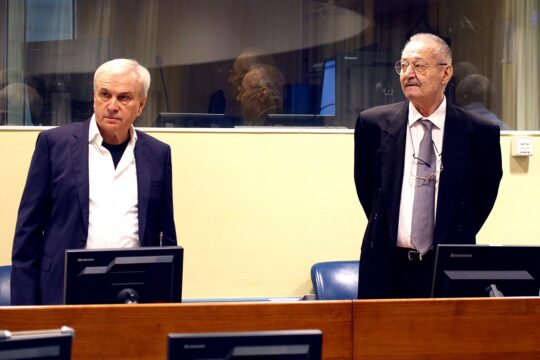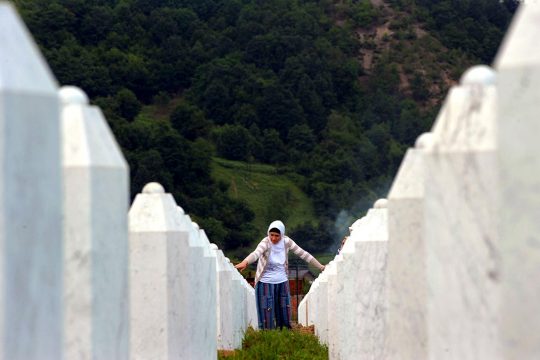The Yugoslav war crimes court Thursday threw out an appeal brought by two former top Bosnian Serb officials against their conviction and upheld a 22-year jail term imposed for their roles in the 1990s conflict.
Mico Stanisic and Stojan Zupljanin had appealed against the 2013 sentence after they were convicted of leading a campaign to rid Bosnia of Muslims, Croats and other non-Serbs during the 1992-1995 conflict.
The two men were close associates of one-time Bosnian Serb leader Radovan Karadzic, who was found guilty in March on charges of genocide and war crimes for his role in the fighting that killed more than 100,000 people and left 2.2 million others homeless.
The appeals chamber at the International Criminal Tribunal for the former Yugoslavia dismissed in their "entirety" the appeals brought by Stanisic and Zupljanin, upheld the convictions, and "affirms the sentences of 22 years of imprisonment," judge Carmel Agius said.
Stanisic, 62, a former Bosnian Serb interior minister, and ex-regional security services chief Zupljanin, 64, were convicted of 10 charges of war crimes and crimes against humanity including murder and torture.
They were also accused of the cruel treatment of non-Serbs in municipalities and detention centres during the war triggered by the break-up of the former Yugoslavia after the fall of communism.
The prosecution had also appealed the sentence as too light "for the seriousness of the crimes."
But while the appeals chamber partly found the prosecution's appeal justified, it refused to impose new sentences against the men.
The two men "are to remain in the custody of the Tribunal pending the finalisation of arrangements for their transfer to the state where their sentence will be served," Judge Agius said.
Based in The Hague, the ICTY in March 2013 convicted the two men of taking part in a joint criminal enterprise known as ethnic-cleansing to remove non-Serbs from Bosnia's municipalities marked to become part of the Serbian state.
They were found to have allowed forces under their command to engage in the "violent takeover of those municipalities and the ensuing widespread and systematic campaign of terror and violence."
The crimes were committed between April and December 1992 in 20 of Bosnia's municipalities and 50 different detention facilities set up by Bosnian Serb forces where captives were beaten, tortured, mutilated, sexually assaulted, humiliated and physically abused.
- Claims of bias -
Defence lawyers had sought to appeal against the conviction and prison sentence, with Stanisic's lawyer Stephane Bourgon accusing the judges of bias during the three-and-a-half year trial.
Bourgon based his argument on a bombshell letter written by Danish former ICTY judge Frederik Harhoff in mid-2013 in which the judge harshly criticised a sudden raft of acquittals before the court.
In the letter, Harhoff claimed the tribunal's then president, US judge Theodor Meron, had leaned on other judges to acquit defendants, suggesting possible pressure from the United States and Israel.
Harhoff was one of the three-judge bench that sentenced Stanisic and Zupljanin, and the defence argued the judge's letter showed he was "on a mission to convict" the accused.
But the appeals court on Thursday ruled the defence had "failed to demonstrate... bias on the part of judge Harhoff."
Bourgon told AFP earlier Thursday that his client Stanisic was nervous ahead of the hearing.
"We take the view that in this case, former Judge Harhoff ventured beyond the conduct that is acceptable on the part of a judge," Bourgon said.
But the defence team had advised Stanisic "not to have any expectations, simply because we know that anything can happen."




